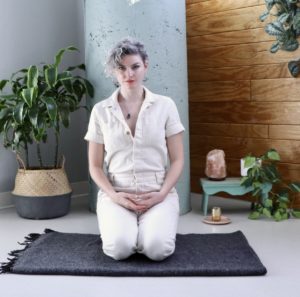How Yoga Changed My Life

I can trace my first introduction to the practice of Yoga back to the now defunct teen magazine called Jump: For Girls Who Dare To Be Real. Each edition had a page that highlighted a specific pose with a pleasant illustration, a description of how to practice the pose, and most importantly, how to cultivate the breath. I remember eagerly turning to that page each month and practicing it in my bedroom before going to school, saving the pages in my journal to return to morning after morning. The pose felt good in my body, but the lasting impact came through in the way I felt afterwards: a gentle calm that flowed throughout my consciousness.
Fast forward to my early twenties; I was in my third year of college in New York City and couldn’t have been more different from the curious, hopeful child I was only years prior. The confluence of anxiety and depression that had always been with me in some capacity had swelled, making my life feel more and more uninhabitable. A friend suggested that I try a yoga class to find some relief and I eventually, begrudgingly, pushed myself to check it out. The studio was packed and my social anxiety was at its peak, but I willed myself to stay and waited, terrified, until the teacher walked to the front of the room to begin.
The sequence for that class was focused on ‘heart openers’ – a group of poses designed to physically open the heart space and broaden the front of the body. The physical cues had me drawing my shoulders back to bring breath and space to the center of my chest, and I realized in that moment how often I moved through my day with my shoulders tensed up towards my ears, my chest drawn inward. How often the weight of my head pulled my chin downwards to turn my face away. How the pressure of these invisible assailants—anxiety and depression—were determining how my body and, in turn, myself, experienced the world.
As the class progressed and I continued to draw my shoulders back, open my chest, and breathe into that tender space, I felt something deeper within me change. The pain and heartache that had seemed impenetrable, that had been such an enormous part of my identity for so long, shifted ever so slightly. The tiniest possibility swept through me and, just for a moment, I was able to imagine a life free from the confines of internal struggle. I suddenly found tears pouring down my face. That moment, small but mighty, changed everything.
Bodywork has since become my primary mode of healing and where I spend most of my time in study. As a dedicated practitioner of Western Yoga for the past decade and a Yoga Alliance registered teacher for the past five years, I constantly turn to these roots to begin any process of somatic understanding. This deep knowledge is powerful and continues to act as my body’s chosen nonverbal language, relaying thoughts and ideas in ways the spoken word never quite can.
More recently, I’ve begun to incorporate more theories and applications found in psychology in order to better work within the more nuanced areas of mental health. As a student of Embodied Philosophy’s MindBody Therapy program, I am now learning to weave psychological theory into the rich tapestry of Eastern philosophy, resulting in a wider vocabulary of what it means to live in a dynamic body.
Despite my years of scholarship with great minds and exemplary teachers, there has been no greater influence that has made me into the nurturing, compassionate practitioner I am today than the students and clients who have been there in classes or sessions with me.
The primary goal of the bodyworker, regardless of theory, modality, or philosophy, is to empower those who come to us as the masters of their own reality. No one knows the sensations of the pose, the deep rhythm of the breath, or the encompassing nature of the practice better than the person currently engaged in it. Just as no one experiences the trials and tribulations of living with anxiety and depression in quite the same way as others do.
The removal of the universal standard in favor of each person’s unique existence is a central tenet of developing a collaborative experience of healing, and one I hold in highest regard.
Each week as I slowly and methodically set up the studio to receive my next client, I think back to that small, scared version of myself all those years ago, timidly unrolling a mat for the first time. She was certain everyone would catch on to how over her head she was, but courageous enough to stick with it. Hers is a journey I cherish and hope to inspire in others.
Kristen Pesature-Olds is Elle’s studio manager offering complimentary 30 minute yoga consults to the mental health clientele of Elle. She is our support system for healing through the body, offering Personalized Self Care Sessions and MindBody Therapy. All of her efforts teach the Elle clientele how to cultivate calm within their bodies.


Comments are closed.